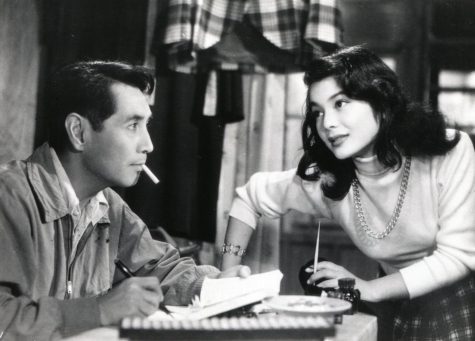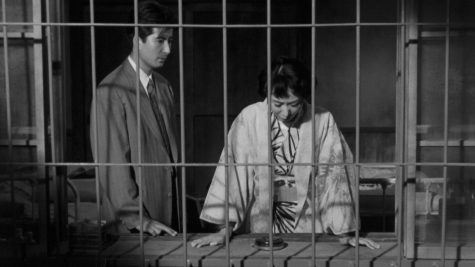Kinuyo Tanaka: master of melodrama
Kinuyo Tanaka’s career as a director has long been overshadowed by her extensive acting career. A new retrospective at Film at Lincoln Center exhibits her mastery over filmmaking with a set of illustrious restorations.
March 25, 2022
Kinuyo Tanaka first became involved in filmmaking at the age of 14. Over the course of her extensive career, she would appear in over 250 films, working alongside the likes of auteurs like Kenji Mizoguchi, Yasujiro Ozu and Keisuke Kinoshita. In the process, she became a symbol of Japan’s blossoming postwar film industry. Tanaka would also go on to become Japan’s second female director, succeeding wartime filmmaker Tazuko Sakane. From 1953 to 1962, Tanaka directed six films that showcased her deep understanding of the filmmaking medium, subverting the norms of melodrama to investigate the role of women in Japanese history.
Tanaka’s move from in front of the camera to behind it was misinterpreted as the move of an aging actress coming to terms with her senescence. Her refined approach to filmmaking and mastery of film’s technical and emotional aspects prove these critics wrong, oppositely positing that Tanaka came to the directing chair at a late age because of her matured understanding of the craft.
Working in the commercial film industry, Tanaka’s projects were massive endeavors from the beginning. For all their weighty historical, political and romantic themes, Tanaka’s approach to filmmaking never faltered, keeping the grandiosity of her themes personal, her images ever-engaging and bringing out impressive performances from every single one of the actors she set her camera on.

Her first feature, “Love Letter,” a conventional romantic dramedy on paper, reveals Tanaka’s intelligence as a director who can flip the most by-the-numbers love story on its head by subverting audience expectations. What begins as a simple comedy slowly morphs into a shocking melodrama that explores the postwar sexual and romantic trauma of couples who were separated by the war.
In “Love Letter,” Reikichi Mayumi (Masayuki Mori) re-encounters a past lover, Michiko Kubota (Yoshiko Kuga) after taking up a job writing love letters for women who seduced American GIs during the war to make ends meet. Mayumi’s pride is struck by the fact that the love he had for Kubota wasn’t as enduring as he had hoped, and Kubota becomes depressed over the fact that her lover will never see her the same way again. What starts off as a silly romantic comedy about a jobless middle-aged man who translates love letters for a zany group of women becomes a meditation on lovelorn postwar trauma. Tanaka seamlessly transforms the act of laughter into an engenderer of tears.
Tanaka’s most famous work, “Forever a Woman” (or “The Eternal Breasts”), similarly steeps itself in the melodramatic to uncover truths about motherhood, mortality and poetry. Based on a screenplay by female screenwriter Sumie Tanaka about the life of tanka poet Fumiko Nakajo (Yumeji Tsukioka), “Forever a Woman” details meaty melodrama as it tracks the poet’s converging rise in fame and fast-approaching death. For Tanaka, melodrama works as a political tool highlighting the injustices women have to endure in Japan on a daily basis.

In “Forever a Woman,” Fumiko is ridiculed for writing poems about mere “female problems.” Her husband is a liar and a cheat, and the only man she ever loved dies before the film’s midpoint. It’s not until Fumiko is diagnosed with breast cancer and undergoes a double mastectomy that an editorial from Tokyo takes interest in her work, revealing how women often don’t get the credit they deserve until it’s too late. In depicting the angst Fumiko endures throughout her short life, the way those around Fumiko belittle her and the hardships that unjustly befall her, Tanaka accentuates the pains of womanhood in postwar Japan through operatic cinema.
Toward the end of her career as a director, Tanaka would go on to tackle these topics more explicitly while empowering other female creators in Japan’s film industry. Her penultimate film, “Girls of the Night” (also known as “Girls of Dark”), concerns itself with the difficulties female sex workers would have reintegrating into Japanese society after prostitution was banned in the late 1950s.
Much like “Love Letter” and “Forever a Woman,” Tanaka’s protagonist here does not get a happy ending and her arduous attempts to regain society’s respect in a close-minded Japan make for a brutal, albeit informative, story about sex workers. As the only female director working in Japan during its Golden Age of Postwar Cinema and one of the only female directors in the world working within the commercial sphere, Tanaka’s repeated willingness to upturn what was expected of mainstream pictures speaks to her courage as an incisive and empowering filmmaker.
Her last film, “Love Under the Crucifix,” a period piece about sexually repressed Christians in feudal Japan, signifies Tanaka taking a step from the subversive into the transgressive. Produced by Ninjin Kurabu, a production company founded by three actresses –– Yoshiko Kuga, Keiko Kishi and Ineko Arima –– “Love Under the Crucifix” demonstrates Tanaka’s mastery of melodrama through its examination of unrequited love and stringent social norms in one of Japan’s most documented epochs.
Unlike other period dramas that glorify the traditions of feudal Japan like “Seven Samurai” and “The Third Shadow Warrior,” Tanaka highlights how some of those codes of conduct have harmed women. In depicting these scenarios, and utilizing melodrama as a tool to do so, Tanaka demonstrates the need for more female directors in commercial Japanese cinema to step behind the camera and illuminate the harmful traditions that need to be eradicated.
Contact Nicolas Pedrero-Setzer at [email protected].
























































































































































